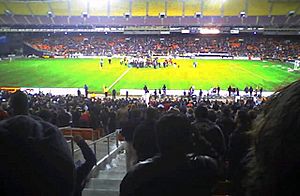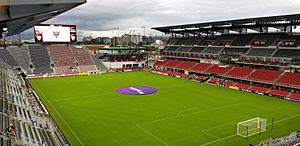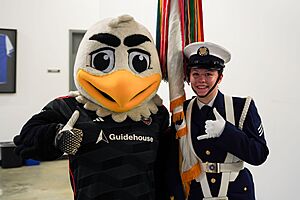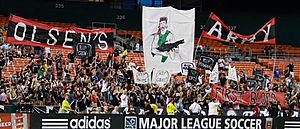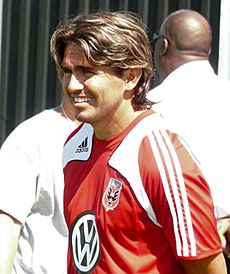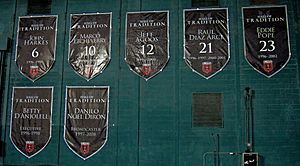D.C. United facts for kids
 |
||||
| Nickname(s) | Black-and-Red Eagles |
|||
|---|---|---|---|---|
| Founded | June 15, 1994 | |||
| Stadium | Audi Field Washington, D.C. |
|||
| Stadium capacity |
20,000 | |||
| Owner | D.C. United Holdings | |||
| Co-chairmen |
|
|||
| Head coach | René Weiler | |||
| League | Major League Soccer | |||
| 2024 | Eastern Conference: 10th Overall: 20th Playoffs: Did not qualify |
|||
|
||||
D.C. United is a professional soccer club from Washington, D.C. They play in Major League Soccer (MLS) as part of the Eastern Conference. D.C. United has won many important titles. These include four MLS Cups (league championships), four Supporters' Shields (for the best regular season record), and three U.S. Open Cups (domestic cups). They have also won six Eastern Conference championships.
Internationally, D.C. United has won one CONCACAF Champions Cup and one Copa Interamericana. They are the only team from the United States to win the Copa Interamericana. With all their trophies, they are one of the most successful soccer clubs in American history, tied with the LA Galaxy.
The club started in 1994 and was one of the first teams in Major League Soccer. They began playing in the league's first season in 1996. For many years, they played at Robert F. Kennedy Memorial Stadium. In 2018, they moved to their new soccer-specific stadium, Audi Field. D.C. United was a top team in the late 1990s, winning most of their trophies then. Famous players like Raúl Díaz Arce, Marco Etcheverry, Jaime Moreno, and Eddie Pope, along with coach Bruce Arena, helped them win eight major titles between 1996 and 2000. They continued to win trophies in the 2000s under coaches Piotr Nowak and Tom Soehn. In 2013, under coach Ben Olsen, they won the U.S. Open Cup, which is their most recent major trophy.
From the 2010s into the early 2020s, the team had mixed results. They won only one major trophy and missed the playoffs many times. During this period, famous players like Wayne Rooney joined the team. Also, young players from their own academy, such as Bill Hamid and Andy Najar, became important. Ben Olsen was the head coach for ten years until he was fired in 2020. Hernán Losada coached until 2022, followed by former player Wayne Rooney. Rooney was fired in October 2023. In January 2024, Troy Lesesne became the new head coach.
Contents
Club History
Before the 1994 FIFA World Cup, the United States Soccer Federation helped create a new professional league, which became Major League Soccer (MLS). On June 15, 1994, Washington, D.C., was chosen as one of the first cities to have an MLS team. The team's name, "United," was chosen to be like famous European clubs such as Manchester United. It also showed that the team represented the capital of the United States.
The team's colors and first logo were announced in October 1995. Black and white were chosen as the main colors, with red as a secondary color.
Early Success (1996–1999)
The club's first season was in 1996. D.C. United hired Bruce Arena as their head coach. He had a great record coaching college soccer. Under Arena, the team quickly became one of the best in MLS. They won two MLS Cup titles, a U.S. Open Cup title, and a Supporters' Shield in their first two seasons. They also won the CONCACAF Champions' Cup and the Copa Interamericana.
During this successful period, the team had a strong group of players known as the "magic triangle": Jaime Moreno, Marco Etcheverry, and Raul Diaz Arce. American stars like Eddie Pope and John Harkes also played for United.
D.C. United's first game was on April 6, 1996, against the San Jose Clash. This was also the very first game in MLS history. United lost that game, but they went on to win the first MLS Cup by beating the Los Angeles Galaxy. They also won the 1996 U.S. Open Cup. This made them the first team in modern U.S. soccer to win both the league championship and the domestic cup in the same year. Their success continued in 1997 when they won the MLS Cup again and their first Supporters' Shield. This made them the first MLS club to win both the regular season and league championships in the same year.
In 1998, D.C. United won the Eastern Conference championship. However, they finished second in the Supporters' Shield race and lost the MLS Cup final to the Chicago Fire. Even without domestic titles, they won the 1998 CONCACAF Champions' Cup by defeating Mexican team Toluca. They also won the 1998 Copa Interamericana, which was a series between the champions of North/Central America and South America. D.C. United was the first American club to win a CONCACAF club championship and the only American club to win the Copa Interamericana.
In October 1998, Bruce Arena left D.C. United to coach the United States men's national soccer team. Thomas Rongen became the new coach for the 1999 season. With a team largely built by Arena, United won both the MLS Cup (their third) and their second Supporters' Shield. Striker Roy Lassiter was a top scorer for the team that season.
Tougher Times (2000–2003)
Arena's departure led to a difficult period for the team. In 2000, D.C. United lost many early games and finished near the bottom of the MLS standings. This was the first time they missed the playoffs. They also had early exits in other competitions.
In 2001, United reached the finals of the CONCACAF Giants Cup but lost to Mexican club América. In the MLS regular season, they again finished last in the Eastern Conference and missed the playoffs. After the 2001 season, coach Rongen was replaced by Ray Hudson.
Hudson's time as coach in 2002 was also tough. United had their worst season, finishing last in the entire MLS. They scored very few goals. However, young talents like Santino Quaranta and goalkeeper Nick Rimando showed promise.
Before the 2003 season, United got the first pick in the MLS draft and chose Alecko Eskandarian. They also brought in experienced players like Hristo Stoichkov. After a slow start, the team improved and made it to the playoffs for the first time since 1999. They lost to the Chicago Fire in the first round. After the season, Hudson was replaced by Piotr Nowak.
Nowak Era and More Wins (2004–2006)
Nowak's first season in 2004 started with injuries. However, D.C. United drafted Freddy Adu, a very young and talented player. Adu became the youngest player in any professional sport in the U.S. since 1887 when he played his first game on April 3, 2004. Adu, along with players like Christian Gómez and Moreno, helped United reach the playoffs. They beat the New England Revolution in a thrilling Eastern Conference Final. Then, they defeated the Kansas City Wizards to win MLS Cup 2004. This was their fourth MLS Cup title, and as of 2025, their most recent.
After winning the MLS Cup in 2004, D.C. United remained one of the top teams in MLS for the next few years. In 2005, they became the first U.S. team to play in the Copa Sudamericana. In 2006, the MLS All-Star Team, which included eight United players and was coached by Nowak, beat English champions Chelsea. In 2006, United also won their third Supporters' Shield.
Soehn Era and Another Cup (2007–2009)
Piotr Nowak left to become an assistant coach for the U.S. national team. His assistant, Tom Soehn, took over as head coach in 2007. The 2007 team, largely built by Nowak, had a very successful regular season. Led by players like Luciano Emilio and Ben Olsen, United finished first in MLS, winning their fourth Supporters' Shield. This was the first time an MLS team won the Shield in two seasons in a row.
After the 2007 season, the team struggled to make the MLS Cup Playoffs for five years. During this time, their only major trophy was the 2008 Lamar Hunt U.S. Open Cup. In 2008 and 2009, they missed the playoffs after poor finishes to the season. Tom Soehn resigned as head coach at the end of 2009. He is the most recent United manager to win two or more major titles.
Olsen Era (2010–2020)
After Soehn, Curt Onalfo became head coach. Recently retired player Ben Olsen joined his staff as an assistant. The team had a very bad start to the 2010 season, with many injuries and poor play.
In August 2010, Onalfo was fired, and Ben Olsen became the interim manager. The team finished the season with a very poor record. However, two young players from the club's academy, Bill Hamid and Andy Najar, became important. Hamid became the starting goalkeeper, and Najar won the MLS Rookie of the Year Award. After the 2010 season, long-time striker Jaime Moreno retired.
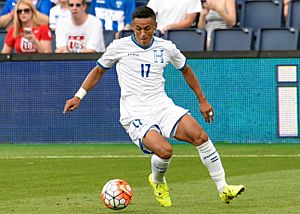
Olsen became the full-time head coach in 2011. He used a defensive style of play, focusing on quick counter-attacks. During his time as coach, United made the playoffs six times and won one major title, the U.S. Open Cup in 2013. They also reached the quarterfinals of the CONCACAF Champions League twice.
In 2011, the team got new players like Perry Kitchen and Dwayne De Rosario. The team improved from 2010, but a losing streak at the end of the season kept them out of the playoffs. Despite this, De Rosario won the MLS Most Valuable Player Award. In 2011–12, Jason Levien and Erick Thohir became the new majority owners. Their main goal was to build a new soccer stadium for the team.
In 2012, United had a much better season, finishing third overall and second in the Eastern Conference. They beat their rivals, the New York Red Bulls, in the playoffs before losing in the Eastern Conference Final.
In 2013, the new owners limited the team's budget to help pay for the new stadium. This meant the team had to rely on many younger and less experienced players. As a result, D.C. United won only three games in the 2013 season, a record low for the league. However, despite their poor league performance, D.C. United won the U.S. Open Cup by beating Real Salt Lake. This was their most recent major trophy. Because they won the Open Cup, United qualified for the 2014–15 CONCACAF Champions League.
In 2014, D.C. United had a huge turnaround. They finished first in the Eastern Conference and went undefeated in the CONCACAF Champions League group stage. This earned them another Champions League spot. However, they were eliminated by the New York Red Bulls in the MLS Cup Playoffs. Coach Ben Olsen won the MLS Coach of the Year Award for this amazing turnaround.
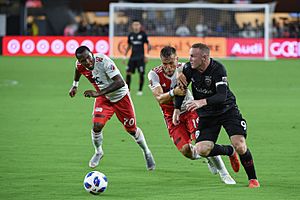
In the later part of Olsen's time as coach, the team made the playoffs in four of his last six seasons but never went past the Conference Semifinals. During this period, the club introduced a new logo in 2016 and opened their new stadium, Audi Field, in 2018. Famous players like Wayne Rooney and Luciano Acosta joined the team. The 2020 season was shorter due to the COVID-19 pandemic. United had an early exit from the MLS is Back tournament and a poor run of games in the fall.
In October 2020, Ben Olsen was fired after coaching the team for a record 10 seasons. He was one of the longest-serving head coaches in MLS history.
Recent Years (2021–Present)
In 2021, D.C. United hired Argentine coach Hernán Losada. Losada changed the team's style of play to be more attacking and focused on fitness. He coached the team for the entire 2021 season, and they just missed the playoffs on the final day. Losada remained in charge for the first two months of 2022. However, due to disagreements with the team's management and a string of poor results, Losada was fired in April 2022.
Some players later said that Losada had poor communication and very strict rules. Management felt Losada was too critical of them. After Losada was fired, assistant coach Chad Ashton took over temporarily. In July 2022, former player and English star Wayne Rooney was hired to coach the team. The 2022 season ended with United finishing last in the MLS.
In 2023, United's record improved, but it wasn't enough to make the playoffs, and Rooney was fired in October 2023. On November 20, 2023, Ally Mackay became the new General Manager. On January 10, 2024, Troy Lesesne signed a three-year contract to be the head coach. In his first season, United again finished with 40 points and missed the playoffs. The highlight was Christian Benteke scoring 23 goals, earning him the 2024 MLS Golden Boot.
Team Colors and Logo
The team's colors and first logo were announced on October 17, 1995. Black and white are D.C. United's main colors, but they are often called the "Black-and-Red." Red is used to highlight their home jerseys, while white is the main color for their away uniforms. The three stripes on the shoulder represent that the uniforms are made by Adidas. In 2011, the team added a red third uniform.
The team's first logo, used in 1996, showed the name "D.C. United" above a black bald eagle on a red background. The eagle was holding three soccer balls over three white stars. The stars and balls were meant to represent the three areas around Washington, D.C. (Washington, D.C., Maryland, and Virginia). The eagle symbolizes speed and power.
The logo was updated before the 1998 season. The eagle now faced left, and the three stars below it were removed. Instead, three raised wing feathers kept the same meaning. A single gold star and a soccer ball were placed in the center of the eagle, representing the team's win in the first MLS Cup in 1996. Since 2005, the logo can have four silver stars above it, showing the four MLS Cups the team has won.
On December 10, 2015, D.C. United revealed a new logo. It features a design inspired by the D.C. flag across the eagle, a new text style, and more dynamic wings.
Sponsors
| Season | Kit manufacturer | Shirt sponsor | Ref. |
|---|---|---|---|
| 1996–2001 | Adidas | Mastercard | |
| 2002–2004 | — | ||
| 2005–2007 | Sierra Mist | ||
| 2008–2013 | Volkswagen | ||
| 2014–2021 | Leidos | ||
| 2022–2023 | XDC Network | ||
| 2024–present | Guidehouse |
Consulting firm Guidehouse became the team's jersey sponsor on February 15, 2024, in a multi-year deal.
Home Stadiums
RFK Stadium (1996–2017)
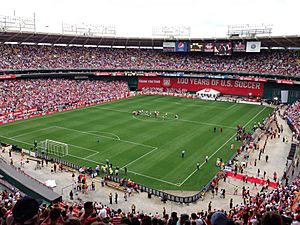
Robert F. Kennedy Memorial Stadium (RFK) was D.C. United's home from their first season in 1996 until the end of 2017. The team's training complex is located near the stadium.
RFK was built in 1961 for both baseball and American football. Before 1996, it sometimes hosted soccer games, including matches during the 1994 FIFA World Cup.
Audi Field (2018–Present)
Audi Field is a soccer-specific stadium in Southwest, Washington, D.C.. It can hold 20,000 people. The first game there was on July 14, 2018, against Vancouver Whitecaps FC. The stadium's naming rights are owned by Audi, who signed a 12-year contract in February 2017.
Plans for a new stadium began in 2006. After some disagreements with the city, a deal for the stadium was announced on July 25, 2013. Construction began on February 27, 2017, and the stadium officially opened on July 9, 2018.
Other Places They've Played
D.C. United has used other stadiums for Lamar Hunt U.S. Open Cup matches. These include university stadiums like Klöckner Stadium in Virginia and George Mason Stadium in Virginia. They have also used the Maryland SoccerPlex in Maryland for early-round games. In 2018, while Audi Field was being built, D.C. United played an MLS game at Navy–Marine Corps Memorial Stadium in Annapolis, Maryland. Sometimes, exhibition games or even regular season matches have been played at FedExField in Maryland.
Club Culture
Fans and Mascot
D.C. United has several main supporters groups. These include La Barra Brava, the Screaming Eagles, District Ultras, Rose Room Collective, 202 Unique, and La Banda del Distrito. At Audi Field, these groups sit together in special sections at the north end of the stadium. La Barra Brava, which means "The Brave Fans" in Spanish, was started in 1995 by Latino fans. They wanted to bring a South American style of cheering to home games.
La Norte was another supporters' club from 2001 to 2016. They were known for sitting behind the north goal at RFK Stadium. La Norte later joined with the District Ultras.
D.C. United's mascot is Talon, a friendly bald eagle character.
Rivalries
D.C. United's main rival is the New York Red Bulls. The two teams play each year for the Atlantic Cup. This trophy is given to the team that earns the most points in their games against each other during the season. D.C. United also has a rivalry with the New England Revolution. A growing rivalry exists with the Philadelphia Union because the two cities are close. D.C. United also has a unique rivalry with the Charleston Battery from a lower league. They play for the Coffee Pot Cup, a trophy created by their fans.
Ownership
When MLS started in 1995, George Soros was the main financial supporter of D.C. United. Later, Anschutz Entertainment Group (AEG) owned the team until 2007.
In May 2007, United started a partnership with Brazilian club Atlético Mineiro to share ideas and grow both clubs.
On January 8, 2007, a new group called D.C. United Holdings bought the team. This group included real estate developer Victor MacFarlane and William H.C. Chang. Over time, Chang bought out other investors and owned 100% of the team by 2009. In July 2012, Indonesian businessman Erick Thohir and sports executive Jason Levien joined Chang as partners. Their goals were to make United a global brand and build a new soccer stadium. Levien became the current majority owner of the team in August 2018.
In recent years, other investors have joined the ownership group. These include NFL running back Mark Ingram II (in 2021), rapper Mario Mims (in 2021), and local investor Devin Talbott (in 2022).
Broadcasting Games
Before 2023, D.C. United matches not shown on national TV were broadcast by NBC Sports Washington. Spanish-language coverage was on TeleXitos.
Since 2023, almost all MLS games, including D.C. United matches, are available on Apple TV through their streaming service. This means fans can watch games online.
For radio, games are broadcast by iHeartMedia on WTSD and WWDC-HD2. Spanish audio is also available on iHeartRadio.
Players
Current Roster
|
|
Players on Loan
|
Youth Academy
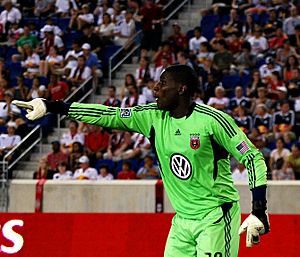
The D.C. United Academy is the club's program for developing young soccer players. It includes the affiliate team Loudoun United FC and academy teams for different age groups (U-15, U-16, U-17). These teams play in MLS Next.
Important players who came from the D.C. United Academy include Bill Hamid, who has played for the U.S. national team, and Andy Najar, who has played for Honduras.
Team Management
Front Office Leaders
| Position | Name |
|---|---|
| Chairman and Majority Owner | |
| Co-Chairman | |
| Minority Owners | |
| President, Business Ops | |
| Chief Financial Officer |
Coaching Staff
| Position | Name |
|---|---|
| General Manager | |
| Assistant GM | |
| Director of Player Personnel | |
| Head coach | |
| Assistant coach | |
| Goalkeeping coach |
|}
Last updated: January 23, 2024
Source: D.C. United
Head Coaches Through the Years
| Name | Country | Years Coached | Major Wins |
|---|---|---|---|
| Bruce Arena | 1996–1998 | 1996 U.S. Open Cup 1996 MLS Cup 1997 MLS Cup 1997 Supporters' Shield 1998 CONCACAF Champions' Cup 1998 Copa Interamericana |
|
| Thomas Rongen | 1999–2001 | 1999 MLS Cup 1999 Supporters' Shield |
|
| Ray Hudson | 2002–2003 | None | |
| Piotr Nowak | 2004–2006 | 2004 MLS Cup 2006 Supporters' Shield |
|
| Tom Soehn | 2007–2009 | 2007 Supporters' Shield 2008 U.S. Open Cup |
|
| Curt Onalfo | 2010 | None | |
| Ben Olsen | 2010–2020 | 2013 U.S. Open Cup | |
| Hernán Losada | 2021–2022 | None | |
| Wayne Rooney | 2022–2023 | None | |
| Troy Lesesne | 2024–2025 | None |
Team Achievements
| National Titles | |||
|---|---|---|---|
| Competitions | Wins | Seasons | |
| MLS Cup | 4 | 1996, 1997, 1999, 2004 | |
| Supporters' Shield | 4 | 1997, 1999, 2006, 2007 | |
| U.S. Open Cup | 3 | 1996, 2008, 2013 | |
| Eastern Conference (Playoffs) | 5 | 1996, 1997, 1998, 1999, 2004 | |
| Eastern Conference (Regular season) | 6 | 1997, 1998, 1999, 2006, 2007, 2014 | |
| Continental Titles | |||
| Competitions | Wins | Seasons | |
| CONCACAF Champions Cup | 1 | 1998 | |
| Copa Interamericana | 1 | 1998 | |
Team Records
These statistics show the all-time leaders for D.C. United in regular season games. Bold names mean the player is still active with D.C. United.
| Category | Record Holder | Total |
|---|---|---|
| Games | 329 | |
| Goals | 131 | |
| Assists | 102 | |
| Penalty Kick Goals | 42 | |
| Game-Winning Goals | 26 | |
| Hat Tricks | 3 | |
| Shutouts | 80 | |
| Wins | 103 |
Team MVP Awards

| Year | Name | Country |
|---|---|---|
| 2004 | Jaime Moreno | |
| 2005 | Christian Gómez | |
| 2006 | Christian Gómez (2) | |
| 2007 | Luciano Emilio | |
| 2008 | Jaime Moreno (2) | |
| 2009 | Clyde Simms | |
| 2010 | Andy Najar | |
| 2011 | Dwayne De Rosario | |
| 2012 | Chris Pontius | |
| 2013 | Perry Kitchen | |
| 2014 | Fabián Espíndola | |
| 2015 | Chris Rolfe | |
| 2016 | Steve Birnbaum | |
| 2017 | Bill Hamid | |
| 2018 | Wayne Rooney | |
| 2019 | Luciano Acosta | |
| 2020 | Julian Gressel | |
| 2021 | Ola Kamara | |
| 2022 | Taxiarchis Fountas | |
| 2023 | Christian Benteke | |
| 2024 | Christian Benteke (2) |
MLS All-Time Best Players
In 2005, four players who played for D.C. United in the 1990s were chosen for the MLS All-Time Best XI (meaning the best 11 players in MLS history):
- Defender:
 Jeff Agoos: Played for D.C. United (1996–2000)
Jeff Agoos: Played for D.C. United (1996–2000) - Defender:
 Eddie Pope: Played for D.C. United (1996–2002)
Eddie Pope: Played for D.C. United (1996–2002) - Midfielder:
 Marco Etcheverry: Played for D.C. United (1996–2003)
Marco Etcheverry: Played for D.C. United (1996–2003) - Forward:
 Jaime Moreno: Played for D.C. United (1996–2002, 2004–10)
Jaime Moreno: Played for D.C. United (1996–2002, 2004–10)
Hall of Tradition
In 2003, D.C. United started the "Hall of Tradition." This honor is given to players, coaches, and staff who were very important to the team's success.
| Name | Position/Role | Years with Club | Year Inducted |
|---|---|---|---|
| Defender | 1996–00 | October 16, 2008 | |
| Forward | 1996–97; 2000 | September 2, 2009 | |
| Betty D'Anjolell | Executive | 1995–98 | June 29, 2008 |
| Danilo Noel Dirón | Broadcaster | 1997–08 | September 2, 2009 |
| Midfielder | 1996–03 | October 20, 2007 | |
| Midfielder | 1996–98 | May 14, 2003 | |
| Forward | 1996–02 2004–10 |
September 14, 2013 | |
| Midfielder | 1998–09 | September 15, 2012 | |
| Kevin Payne | President/CEO | 1994–01 2004–12 |
October 2, 2015 |
| Defender | 1996–02 | July 18, 2010 | |
| Midfielder | 1996–00, 2002 | October 15, 2011 |
See also
 In Spanish: D. C. United para niños
In Spanish: D. C. United para niños
 | Frances Mary Albrier |
 | Whitney Young |
 | Muhammad Ali |


